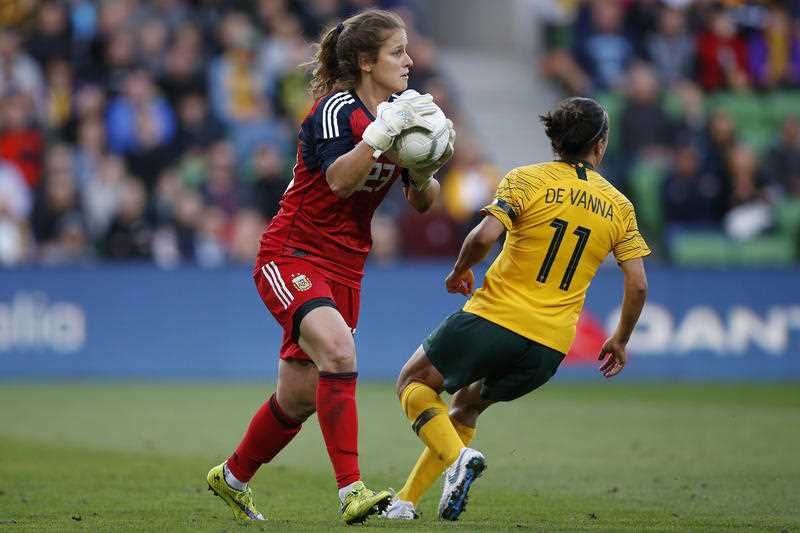Former Melbourne Victory player Gabriela Garton believed she became dispensable following the birth of her first child.
“I found myself stressed and worried about whether clubs were going to want me once I had my child,” she told AAP.
“You don’t have the security to know what you’re going to be doing for the next few years.”
Garton stepped away from playing in 2021 after two decades of a professional soccer career, which included representing Argentina at the 2019 Women’s World Cup.
The American-born Argentine goalkeeper had every intention to return to the pitch and continued to train with Victory after giving birth.
“But I was out of contract when I fell pregnant,” she said.
“You’re not getting paid for your time.
“It’s basically out of your own desire to get back into football without really the formal support of the club.”
While Garton believes the club did everything it could to support her by offering her a role as a developmental coach, pregnancy continues to be a taboo subject in locker rooms across many sports.
Garton says athletes are afraid to talk about the possibility of getting pregnant out of fears they will be overlooked in favour of another player.
“It’s something that will be held against you or could negatively impact your playing career,” she said.
“And even though it’s illegal to discriminate, it’s difficult to prove in the sporting context.”
Professor Alex Parker says a lack of support for pregnant athletes is one of the reasons she’s leading research into wellbeing and safety for women in sports.
“We know that women aren’t just small men,” Dr Parker said.
“But a lot of existing studies assume that women pretty much function in the same way as men, so there is a huge gap of knowledge.”
Victoria University surveyed dozens of elite athletes from three major national sports, uncovering mental health and safety concerns.
Dr Parker acknowledged the sample size of 39 athletes was small but said the study was undertaken during strict COVID-19 lockdowns and sporting protocols.
Regardless, she said people needed to be cautious about how they interpreted some of the findings.
Almost two in three of the participants indicated a likely mental health condition while half reported exposure to physical or sexual violence.
Athletes reported experiencing violence online and from their peers, coaches and parents.
One in three reported they earned just enough money to make ends meet while at least one respondent said they often struggled to survive.
Women athletes also struggled with eating disorders and body images, career instability with shorter contracts and adequate facilities with medical staff.
Dr Parker is calling on Australian elite and semi-professional women athletes to take part in a nationwide survey to capture a fuller picture of what’s happening.
“This is an urgent call to all women athletes to share their experiences confidentially and be part of improving sport participation in Australia,” she said.
“If we get the data, then we can’t ignore what’s happening.”
Garton believes the survey could mean real change for women’s sports.
“It’s an ambitious idea but the reward of doing so is being able to influence change hopefully where future generations won’t have to struggle,” she said.
“If I tend to envision my career without these challenges, it would be playing at a top club and having a side job because I want to, not because I have to.”
The Victoria University survey is available online.
By Joanna Guelas in Sydney



